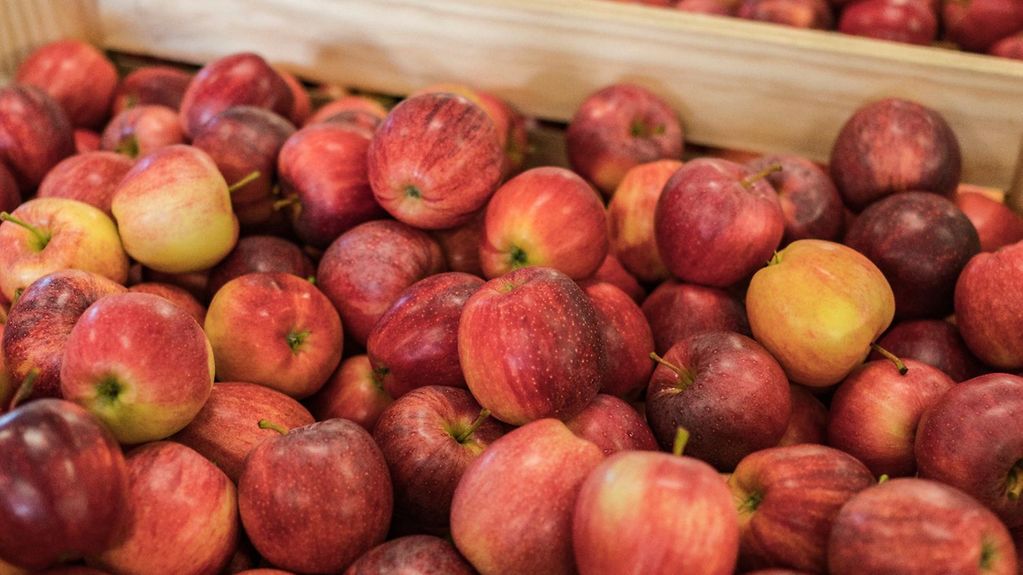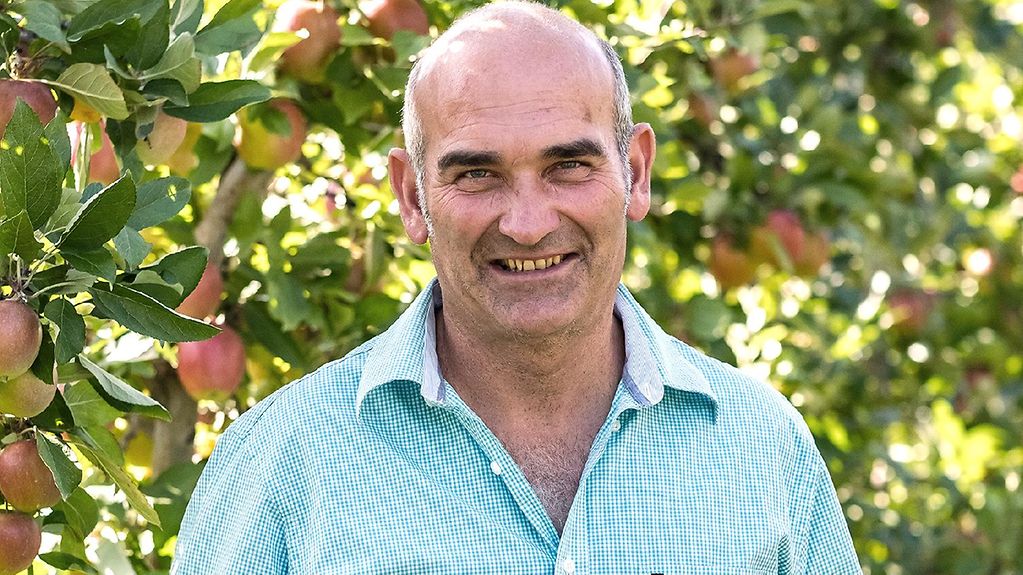Der Link wurde in Ihrer Zwischenablage gespeichert
Healthy fruit at affordable prices: a visit to a farm along the Franco–German border during the apple harvest reveals how the European Union shapes agriculture – and what that means for consumers.
6 Min. Lesedauer

This year's apple harvest was abundant, with the OGM expecting it to yield more than 20,000 tonnes
Foto: Ramesh Amruth
A crate of apples is slowly being pushed into a water bath. Three hundred kilogrammes of Jonagold apples bob up out of the water, are gently pulled along by the flow, scanned more than 40 times and then mechanically sorted by colour, size and the redness of their skin. Wendelin Obrecht, a fruit grower and Chair of the Board of Directors of Obstgroßmarkt Mittelbaden eG (OGM), a cooperative of fruit farmers in the Central Baden region, picks out an apple and examines it closely: It's perfect, not too big, it'll fetch a good price.
It is here in this sorting facility that the cooperative prepares apples sourced from its around 1,800 members to be sold in grocery stores. It's mid-September and the harvest is well under way. Hundreds of crates are piled up in the delivery area, full of different varieties of apple which are all giving off their sweet aroma.
The cooperative, about the size of four football pitches, lies on the outskirts of Oberkirch in the idyllic Rench Valley in the Ortenau region of Germany. The region's mild climate is ideal for apples, berries and Zwetschge plums. The Black Forest rises to the east, and Strasbourg Cathedral is within sight, only 25 km away and clearly visible from the surrounding hills on a clear day. Here, in the middle of the Franco–German Eurodistrict, Europe has always been a lived reality.
It is not only German agriculture which benefits from EU funding. In 2017 Germany received more than 4.4 million euros in funding from Brussels for research, economic development and the adaptation of living standards.
The OGM cooperative benefits from its proximity to the French border: it not only employs workers from its western neighbour – farms in the Alsace region are also part of the cooperative, says Marcelino Expósito, its Managing Director. The cross-border movement of goods within the EU makes everything very easy: apples are grown and harvested in France, sorted in in Oberkirch and then sold in French supermarkets.
The cooperative also delivers its fruit to Austria, Switzerland and the Scandinavian countries. Obrecht grows his apples on five hectares of land. Besides apples he also grows strawberries, currants and grapes, the latter destined for the local winegrowers' cooperative. He took over the farm from his father early on. Now he runs it together with his wife, and his mother still helps out.
Farmers in Oberkirch grow their produce on small parcels of land. The long-held tradition of dividing up farmland in the course of succession has left its mark on the landscape. Like many of his colleagues across Europe, Obrecht believes he would not be able to continue farming without the EUʼs payments. All of the farms in the cooperative receive EU direct payments, on average around 285 euros per hectare per year. In addition to making these direct payments, the EU also invests in infrastructure, which Obrecht thinks is important, too. The payments themselves are very valuable for farm development, both for the OGM and the producers themselves.
Over the last few years the EU made investments totalling around 1 million euros a year on average.
Obrecht, too, has to invest a great deal to stay on top of the game. To protect his crops against hail damage, for instance. Apples are very sensitive, and food retailers are very demanding. His harvest has suffered from hail damage most years since 2008. That is why Obrecht has stretched thin black nets fixed to wooden constructions over his plots of land. The nets protect his fruit against even the small hailstones – and also against overexposure to sunlight.

"EU payments are very valuable for farm development," says Wendelin Obrecht
Foto: Ramesh Amruth
In a region in which there is almost full employment, farms are reliant on help from abroad. Many of the helping hands which secure our harvest come from Poland and Romania. Without seasonal workers from eastern Europe the shelves in German stores would be practically empty of fruit,
says Obrecht.
Even the smallest farms hire one or two workers from eastern European, usually for up to two months at a time. Naturally, they earn the German minimum wage of 8.84 euros an hour (the 2018 rate). Obrecht is convinced that the main beneficiaries are German consumers, because they get the best quality fruit at affordable prices.
Consumers benefit from the wide range of fruit on offer from across the whole of Europe: Spanish strawberries, peaches from France and apples from South Tirol. But for Oberkirch that means that, like all the other fruit-producing regions in Germany, his cooperative is in competition with other European producers. Given its large population and strong purchasing power, Germany is a very interesting market.
That is an advantage for consumers, but poses a challenge for producers. Especially when they have to meet Germany’s high standards, for instance when it comes to pest management and water protection or workers’ health and safety. Obrecht also says that the fact that the EU has not harmonised minimum wages makes things difficult for producers. Overall, though, both Obrecht and Expósito take their European competition on the chin and trust that food retailers and consumers will appreciate the quality of their fruit.
Many people come here in April to see the cherry blossom
The apple trees grow in neat, straight rows. The light is shimmering, it is a warm, almost hot, day in late summer. Romanian harvesters are hard at work, carefully laying the sensitive applies in crates. This year's harvest is abundant. More than 20,000 tonnes, according to OGM estimates. Only perfect apples will make the grade, though.
Under the EU treaties, all EU citizens have the right to work in another member state. More than half a million working-age Germans live in another EU country.
Just look at this wonderful cultural landscape,
Obrecht says enthusiastically. The small plots may make farming difficult, he adds, but they make the area a very attractive tourist destination. Next to the apple trees there are Zwetschge plum trees, next to them cherry trees, behind those currant bushes. A little further off another producer has decided to leave the flowers in his meadow untouched. Footpaths zigzag across the fields.
Obrecht and the many other full-time and part-time producers are proud of the region they call home, proud of the work they do. They don't all manage to find someone to take over their farms when they retire, and so some have to give them up altogether. Obrecht has already settled the matter of succession: his son is off studying horticulture and plans to join him on the farm soon. Apples, berries and plums from Oberkirch – tasty fruit which will continue to sweeten both German and European consumers' lives well into the future.
This reportage is taken from the first edition of the Federal Government's new magazine called schwarzrotgold, which was dedicated to Europe. Published on 17 December 2018, it has been available free of charge in trains and at airports since then. Until mid-January it will also be available as an insert in various magazines and daily newspapers. A PDF file of the text is available to download on this website (see yellow box below).